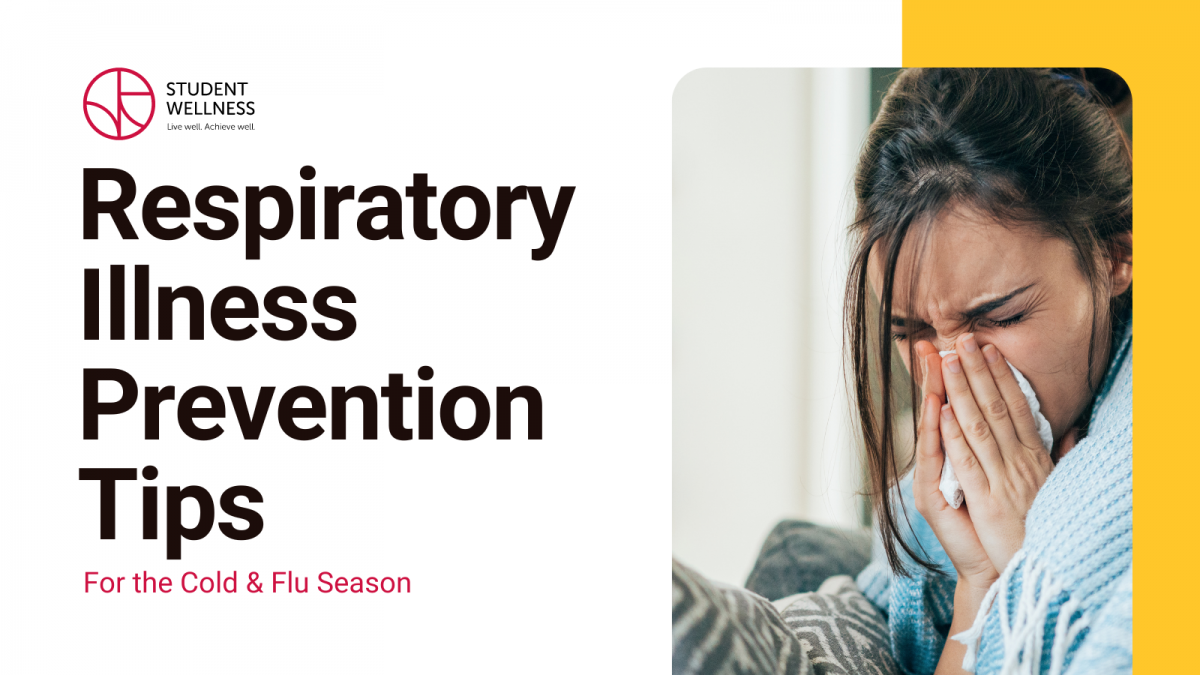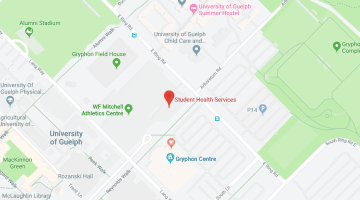
Make your health and yourself a priority this school year with these tips for staying healthy & avoiding contagious respiratory illnesses like influenza (FLU), COVID-19 and the common cold.
Topics included:
- Campus Immunization & Flu Shot Clinics [1]
- Respiratory Illness Prevention Tips
- What To Do If Someone You Live With Is Sick
- Tips to Naturally Boost Your Immune System
- ILI (Influenza-Like Illness) [3]
Respiratory Illness Prevention Tips
Get vaccinated: The best defense against the flu is the flu shot. Immunization against the flu will be important this fall with COVID-19 also circulating in our communities, and you can get your flu and COVID-19 vaccines at the same time at the University of Guelph’s Health Services.
- Both flu shots and COVID-19 vaccines are available through Student Health Services [1]. Visit our website for dedicated flu shot drop-in clinic hours Vaccination webpage [1] or learn more by calling 519-824-4120 ext. 52131 → 3 →1.
- Please check with your family doctor or primary care provider to book a flu vaccine for ages 6 months and older.
- Contact your local pharmacy [4] to book a flu vaccine for ages 2 and older.
- Public Health [5] is offering flu shots as follows:
- If you would like your flu shot only, appointments are available through the online booking system [6] or by calling 1-800-265-7293 ext. 7006. Check back regularly as new appointments will be added.
- If you have an appointment for a COVID-19 vaccine, you will be offered the flu shot at your appointment. There is no need to book a separate flu shot appointment.
Practice good hand hygiene: Viruses can live on your hands for up to 3 hours. Wash your hands correctly (for at least 15 seconds) and often.
Cover your mouth when coughing or sneezing: Use a tissue, or cough and sneeze into your arm (not your hand) and turn away from other people. Be sure to wash your hands or use sanitizer after.
Wear a mask: To help ensure you are protected in public spaces, and where physical distancing cannot be maintained, wear a medical mask (N95 masks are best, but medical-style masks are good).
Avoid touching your face: Cold, flu and Covid-19 viruses can be picked up by our hands and get into the body through our eyes, nose, and mouth which all act as pathways to the throat and lungs.
Stay at home when you're sick: Viruses spread easily in group settings such as cafeterias, libraries and lecture halls. Please stay at home when you are sick, so you do not spread the illness to others.
Clean surfaces & shared items: Some viruses live on hard surfaces for up to 8 hours. Wipe down any surfaces you are going to touch and sanitize spaces afterwards for the next person when you can.
What to do if someone you live with is sick
Practice good hygiene: Many viruses can live on your hands for up to 3 hours. Clean your hands with soap and water or alcohol-based hand sanitizer after each contact with the sick person and throughout the day.
Spend time away from your home: Limit close interactions with the sick person. If you can, spend time away from your residence room/housing unit while someone else is isolating
Wear a mask when in your home in shared spaces: Wear a medical mask (N95 masks are best, but medical-style masks are good) in shared spaces with your roommate and when you are out in public (close contacts must wear a mask for 10 days after their last unprotected contact with a case). Your roommate should also wear a mask when you are together in a shared space.
Improve fresh air supply and indoor air quality: Open windows when weather permits, and run bathroom/kitchen exhaust fans, and your portable air cleaner if you have one.
Don’t share items: Don't share items like towels, cups, dishes, or phones and frequently disinfect commonly touched surfaces e.g., light switches, doorknobs and sink and toilet handles. After use, items should be washed with liquid soap or detergent in warm water. No special soap is needed. Dishes do not need to be separated out and can be cleaned as usual in the dishwasher. Do not share cigarettes or vapes.
Monitor for respiratory illness, and see a doctor if you have:
- a fever of 38.5°C for more than 48 hours
- chest pain or shortness of breath
- coughing spells or coloured sputum
- a persistent sore throat or swollen glands and neck
Related:
There are many steps you can take to support your body to reduce the risk of more severe illness. Consider the following in your daily life provided by the Health and Performance Centre's Naturopathic Doctor, Dr. Kristina Brooks [8].
- Get enough sleep. Learn about our Better Sleep Program [9]
- Stay hydrated
- Make time for rest & relaxation.
- Eat whole foods when possible. Access our nutrition services and resources. [10]
- Consume a source of protein with each meal.
- Stay active with Regular Moderate Exercise.
Read the full article “Six Steps You Can Take Today To Support Your Immune Health” [11] →
Other resources:
- Campus doctors/nurse appointments & same-day clinic details [12]
- List of pharmacies in the area that are providing flu shot clinics [4]
- Guelph Drop-In Clinics & Family Doctors [13]
- ILI (Influenza-Like Illness) [3]
- Health Services Self-Care Resources [14]
- Six Steps You Can Take Today To Support Your Immune Health [11]
- Tips for Improving Your Immunity and Vitamin D Levels [15]
